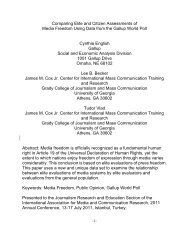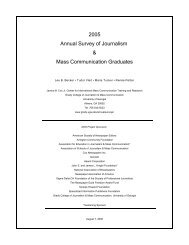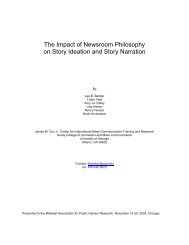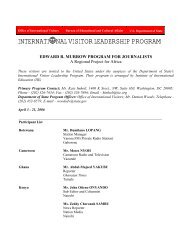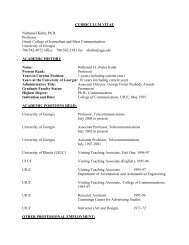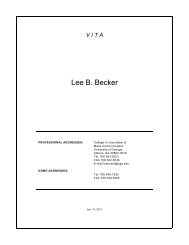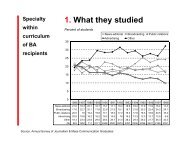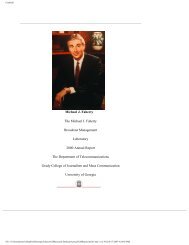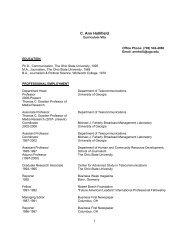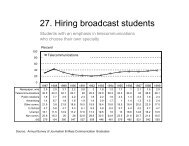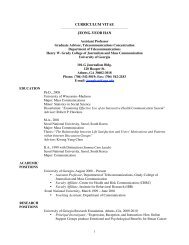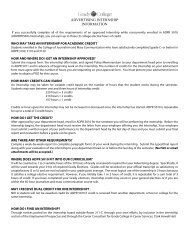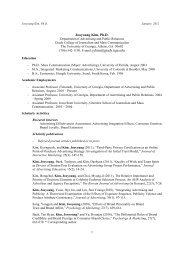Professionalism of News Workers - Grady College of Journalism and ...
Professionalism of News Workers - Grady College of Journalism and ...
Professionalism of News Workers - Grady College of Journalism and ...
You also want an ePaper? Increase the reach of your titles
YUMPU automatically turns print PDFs into web optimized ePapers that Google loves.
<strong>Pr<strong>of</strong>essionalism</strong> <strong>of</strong> <strong>News</strong> <strong>Workers</strong>: The Creation <strong>and</strong> Evolution <strong>of</strong> the Concept Page 20<br />
dominant coalition had more decision-making power, <strong>and</strong> a stronger management role, than did<br />
practitioners outside the dominant coalition. Serini (1993) conducted an observation study in which she<br />
examined how public relations practitioners sought decisional autonomy in a high tech firm. She argued<br />
that autonomy in an organization is an important characteristic <strong>of</strong> a pr<strong>of</strong>ession. She concluded that the<br />
pr<strong>of</strong>essionalism helped the PR practitioners to change the management <strong>of</strong> the firm. Citing Beam (1990),<br />
Grunig (2001) calls this a “power-control” approach in which researchers measure the amount <strong>of</strong> power<br />
<strong>and</strong> control practitioners have to “carry out their work based on the knowledge <strong>and</strong> st<strong>and</strong>ards <strong>of</strong> their<br />
pr<strong>of</strong>ession” (p. 26). This approach, however, focuses on a specific pr<strong>of</strong>essional trait – autonomy.<br />
Contemporary View <strong>of</strong> <strong>Pr<strong>of</strong>essionalism</strong> in Sociology <strong>of</strong> Work <strong>and</strong> Occupations<br />
th<br />
For sociologists in the first half <strong>of</strong> the 20 century, pr<strong>of</strong>essions were evaluated on their structural<br />
<strong>and</strong> functional similarities. The four traditional pr<strong>of</strong>essions--the clergy, the military, medicine <strong>and</strong> the law--<br />
were looked at as models for the evaluation <strong>of</strong> all other pr<strong>of</strong>essions. The characteristics that these<br />
pr<strong>of</strong>essions embodied became the eight criteria articulated by Lieberman in his 1956 book, Education as a<br />
Pr<strong>of</strong>ession, <strong>and</strong> served as the benchmark for McLeod <strong>and</strong> Hawley's pr<strong>of</strong>essional orientation measures.<br />
At one level, pr<strong>of</strong>essions were thought to serve a specific role in society. This ideal was advocated<br />
by many sociologists, including Durkheim who saw pr<strong>of</strong>essional organization providing social cohesion<br />
<strong>and</strong> who viewed pr<strong>of</strong>essional ethics as the foundation <strong>of</strong> a new moral order (1957).<br />
Lieberman also connected the increasing importance <strong>of</strong> the pr<strong>of</strong>essions in modern life to the<br />
advancement <strong>of</strong> democracy, a perspective that was popular in the heat <strong>of</strong> the Cold War. He asserted that<br />
the advancement <strong>of</strong> pr<strong>of</strong>essions requires a degree <strong>of</strong> independence <strong>and</strong> autonomy “which could hardly be<br />
tolerated in a totalitarian society,” <strong>and</strong> concluded that “perhaps it is more to the point to see that our<br />
continuing to have a democratic society depends in part upon our continuing to have pr<strong>of</strong>essions" (1956,<br />
p. 11).<br />
The service ideal needed to be addressed if pr<strong>of</strong>essions were to proliferate in the emerging<br />
capitalist bureaucracies <strong>and</strong> technocracies. The pr<strong>of</strong>essional characteristics advanced by Talcott Parsons<br />
(1954) sought to extend pr<strong>of</strong>essional status to encompass occupations in the business sector. Parsons<br />
attempted to moderate the self-centered, egoistic portrayal <strong>of</strong> the businessman by re-categorizing the



